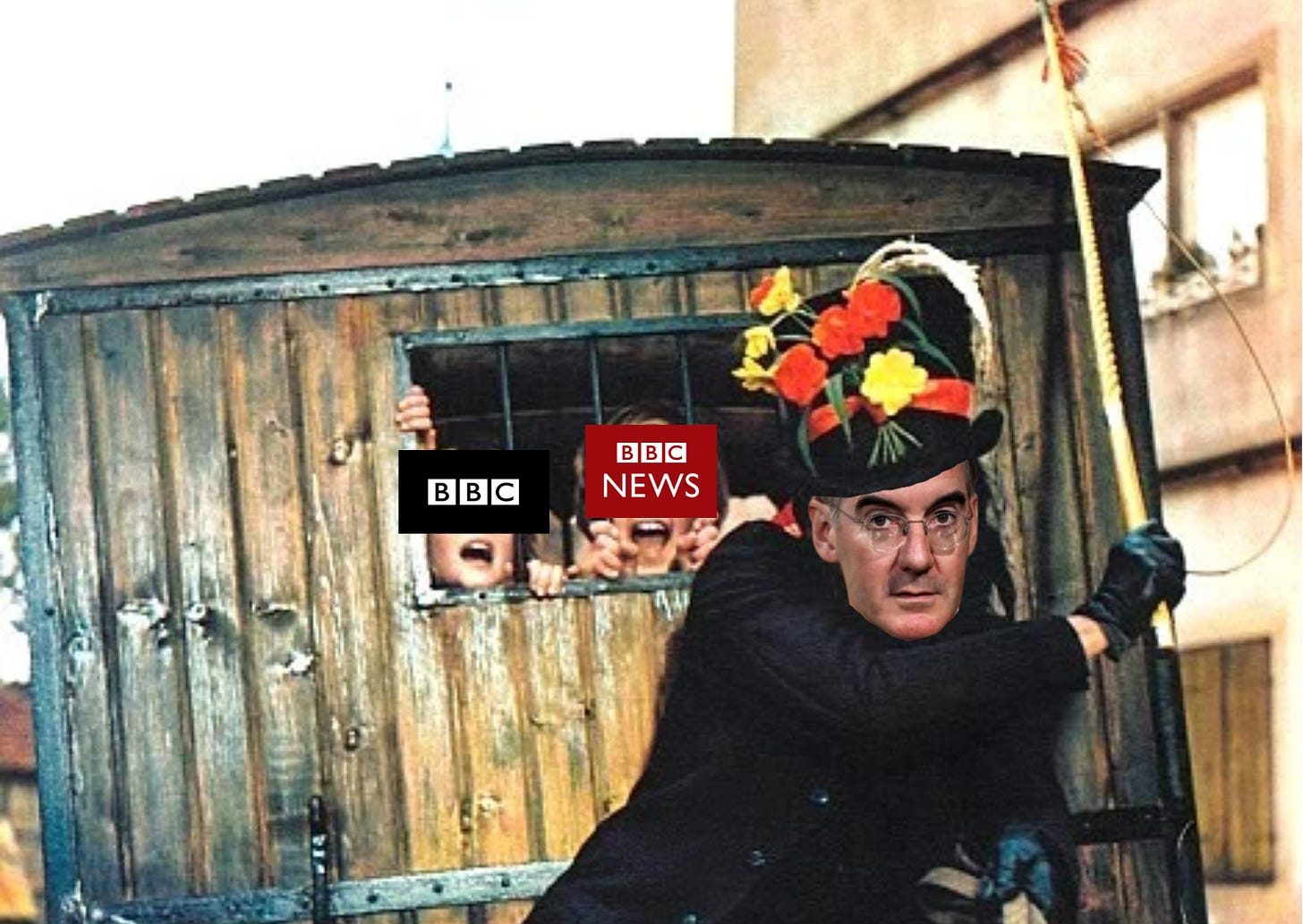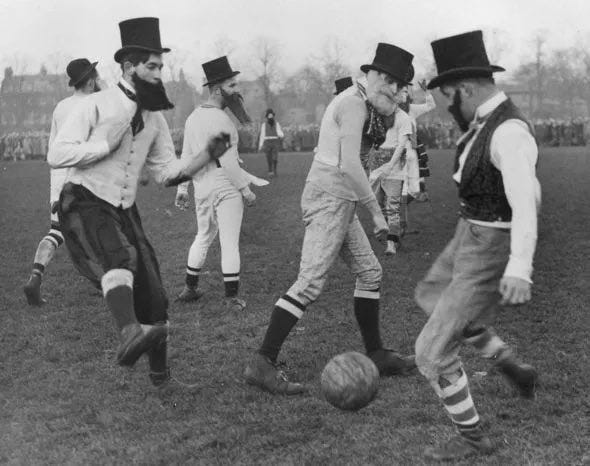The Member for Murdoch: Jacob Rees Mogg seeks revenge in the BBC recruitment row
Parliament's most ludicrous cosplayer presents equally ludicrous claims that the corporation is simply not right-wing enough.
Jacob Rees-Mogg’s persona is as much of an invention as his boss Alexander Boris de Pfeffel Johnson’s ‘Boisterous Boris’ character. He is delighted to be referred to as “the Honourable Member for the 18th Century” because it offers validation for his Lord Snooty vaudevillian act.
Mogg is not, in fact, a toff from a long line of toffs, but the son of the journalist William Rees-Mogg, who went from a middle-class childhood via Balliol College, Oxford and the British media, including time as the editor of The Times, to become Baron Rees-Mogg, of Hinton Blewett in the County of Avon.
Jacob Rees-Mogg’s pseudo-aristocratic eccentricity is a product of his father’s success. He is as ludicrous as those children who become second-generation stars on the back of their parent’s fame. With vast wealth achieved in that most modern of robber baron pursuits — hedge fund investing — Rees-Mogg’s move into politics was, in part, an attempt to do what his father had not (William unsuccessfully stood as a Tory candidate in a by-election in 1956 and in the general election of 1959).
Jacob Rees-Mogg’s election to Parliament on the third attempt — during his first, a disastrous run in Fife during the 1997 general election, he famously took his nanny canvassing — Rees-Mogg also managed to match the achievement of his father-in-law, Somerset de Chair, who was the Conservative MP for South West Norfolk from 1935 to 1945 and then Paddington South from 1950 to 1951.
Mogg’s marriage to de Chair’s only daughter, Helena, added some actual aristocratic sheen to his act. Her mother — de Chair’s fourth wife — Lady Tadgell is an actual blue blood with a £45 million fortune inherited from her father.
Mogg’s fortunes have been bolstered by Brexit, after he and his partners in Somerset Capital Management, the hedge fund he co-founded in 2007, opened two new funds in Dublin rather than London. His declaration in the House of Commons Register of Interests says he is paid £500 an hour for his work at SCM and takes home roughly £15,000 a month on top of his MP’s salary.
I raise this background as a reminder that beneath the country squire act, Rees-Mogg is a ruthless operator. That is further evidenced by his co-operation with a monthly podcast from ConservativeHome called The Moggcast.
The production gives him a tame outlet for his opinions and allows him to speak directly to some of the most spittle-flecked hardliners in the Tory base. He also knows that his most controversial comments will inevitably be picked up and amplified by his dear friends at The Daily Telegraph.
And that is exactly what happened with yesterday’s edition (The Moggcast, Episode 62) which features his comments on the entirely confected row over BBC recruitment and former HuffPost UK editor-in-chief/Newsnight deputy editor Jess Brammar.
Teed up by ConservativeHome’s Local Government Editor, Harry Phibbs, asking him about his views on GB News (Shocker! He likes it), Rees-Mogg segued into an attack on the BBC and Brammar while unconvincingly pretending that he doesn’t really know who she is, where she’s worked, or how they’ve clashed in the past. He says on the podcast:
There’s a row going on in the BBC about appointing someone from a left-wing organisation. You have to say to yourself, ‘When did the BBC last hire somebody from ConservativeHome to come and be their senior figure? Or from The Daily Telegraph?’
Rees-Mogg knows who that ‘someone’ is because Brammar, while HuffPost UK’s Editor-in-Chief, defended one of her reporters, Arj Singh, against insinuations made by him in the House of Commons in March 2021. And if he had somehow forgotten the incident, he needed only to refer to yesterday’s Times which used it as an example to imply that Brammar is not suitable for a new role at the BBC:
Brammar had become embroiled in a bitter dispute with Downing Street in January in her role as editor of the HuffPost UK website. Kemi Badenoch, the Treasury and equalities minister, used Twitter to accuse a HuffPost reporter of “looking to sow distrust by making up claims”.
Brammar responded by accusing Badenoch of fuelling the abuse of “young, female, black journalists”. Two months later Jacob Rees-Mogg, leader of the Commons, accused another HuffPost journalist of being “either a knave or a fool”. Brammar accused him of using the protection of parliamentary privilege “to smear a journalist”.
As I wrote yesterday, the major and (intentional) omission in The Times’ reporting there is that Brammar was merely stating a fact: Rees-Mogg did use parliamentary privilege to attack Singh’s reporting. It also neglected to mention that the MP used those comments to big up The Times, his father’s old paper.
Rees-Mogg told parliament he thought such “poor quality, online journalism” was “not the sort of thing that would happen in The Times.” As well as being where his father made his name, The Times is owned by Rupert Murdoch, a firm friend of Jacob Rees-Mogg. Their last publicly declared meeting was listed by Rees-Mogg as “an informal lunch between friends”.
Ignoring the far more recent appointments of Tim Davie — a former Tory council candidate — as Director-General, and Richard Sharp — a mentor to Rishi Sunak who recently donated £400,000 to the Conservative Party — as BBC Chairman, Rees-Mogg reaches back to Andrew Marr’s appointment as the BBC’s Political Editor in… 2000. Still, it’s appropriate that a man who pretends to live in the past is still fighting a battle from 21 years ago. He tells Phibbs:
I remember when they appointed Andrew Marr as their political editor, who was a polemicist for one of the left-wing newspapers, somebody said to them why haven’t they appointed Boris Johnson or someone from the right? And, of course, they said, ‘Well, we can’t possibly do that. He’s far too controversial.’ When it’s the left, it’s fine. When it’s from the right, it’s beyond the pale.
In line with my idea that these culture war campaigns are not about defending the right to free speech but the freedom of right speech, Rees-Mogg blithely contradicts himself there. He attacks the BBC over the potential recruitment of a woman who previously worked at broadcaster because he believes HuffPost to be irredeemably left-wing while arguing that right-wingers should be privileged.
His idea that the BBC has no place for right-wing people is further undermined by an earlier comment in the podcast. In his praise for GB News he says:
It’s very good. I’m a great fan of Andrew Neil, who I think is a brilliant interviewer, the best-prepared interviewer. It always seemed to me that he did his homework more thoroughly than anybody else and therefore being interviewed by Andrew you always have to be on your toes.
That’s Andrew Neil who spent 25 years at the BBC as its most high profile political interviewer, while also serving as Chairman of that notoriously Marxist magazine… The Spectator. And when Rees-Mogg sneers about Andrew Marr’s past as a “polemicist for one of the left-wing newspapers”, he perhaps doesn’t say The Independent by name because his own father had a column there for six years before he returned to The Times as a columnist.


William Rees-Mogg was also a governor and vice-chairman of the BBC. In 1985, when a documentary about Ulster, part of the Real Lives strand, was banned following a clash between the governors and the Director-General over its content, journalists went out on strike. Rees-Mogg claimed the fly-on-the-wall technique…
… [had] a tendency to present both people as being perhaps misguided people, but nevertheless as having their own point of view, and if you happen to like blowing up innocent people, well that’s your privilege.1
BBC Northern Ireland’s Controller, James Hawthorne, had a very different view:
However they put it, the Governors had made a decision under pressure from the Home Secretary and against the considered advice of the most experienced and senior editors of the BBC. They had banned the programme because they disliked it. They had made liars of us all. 2
The programme was later amended and broadcast, but the damage was done.
Now, 36 years on, Jacob Rees-Mogg is following in his father’s lead again, attempting to undermine the BBC’s independence while claiming to defend it. His Mogcast comments end with an encomium for Laura Keuenssberg and another snide attack on Brammar, who he continues to refuse to name:
I think the BBC does itself a lot of damage in this regard. People like Laura Kuenssberg make their political and professional reputations on being completely impartial and she gets criticised by the left and the right in pretty much equal quantity. And then the BBC management goes off and starts suggesting it should manage someone from a left-wing outlet, and that damages the whole perception of independence and impartiality in the BBC.
What damages the perception of independence and impartiality in the BBC is the rampant use of anonymous government sources by reporters like Kuenssberg and the efforts of the government to stuff the upper reaches of the corporation with tame Tories, ‘review’ the role of public sector broadcasting, and install rabidly anti-BBC figures in key positions, like Paul Dacre at Ofcom.
Jacob Rees-Mogg may pretend that he’s fallen through a wormhole from 1890, a stranger in this time confused by the squawking idiot box, but he’s an Instagram-loving, hedge fund profiting charlatan who wants to continue his father’s ‘good’ work of pushing the public discourse ever further to the right.
The Rise and Fall of Television Journalism: Just Wires and Lights in a Box? — Steven Barnett (2011)
Ibid.





